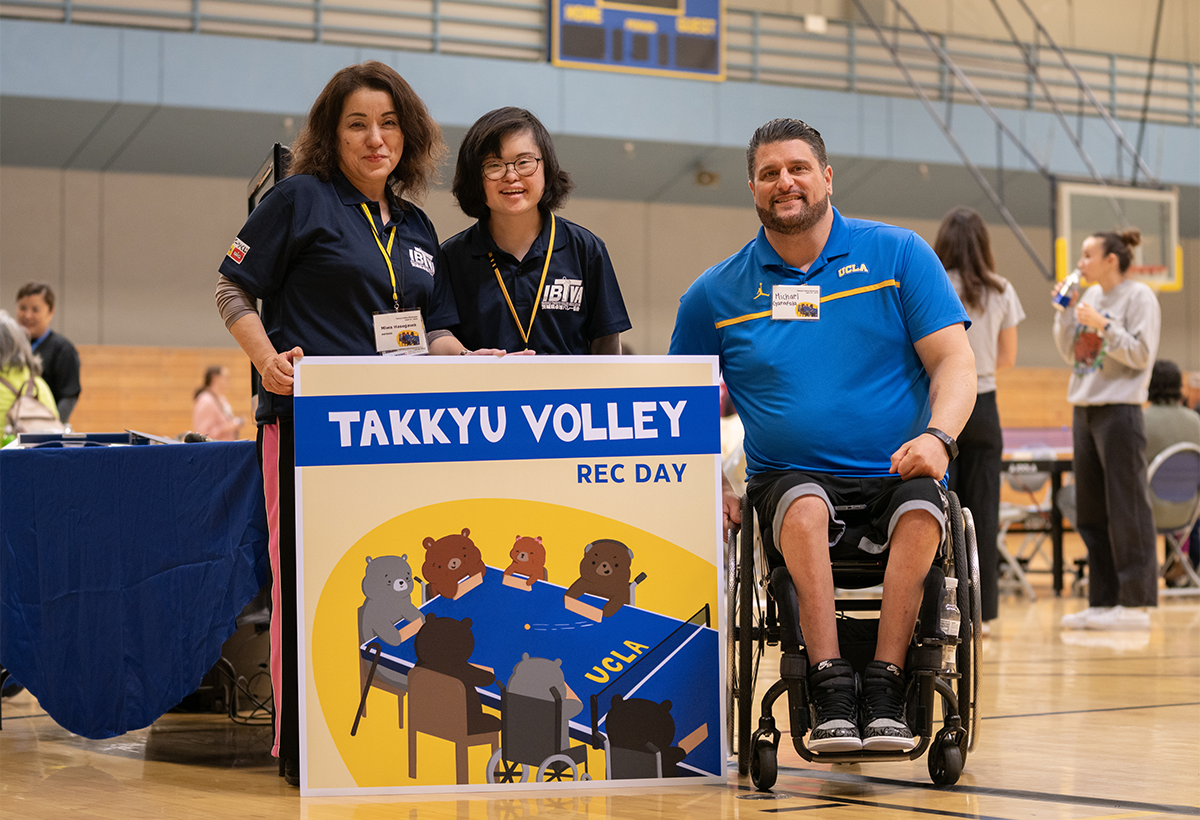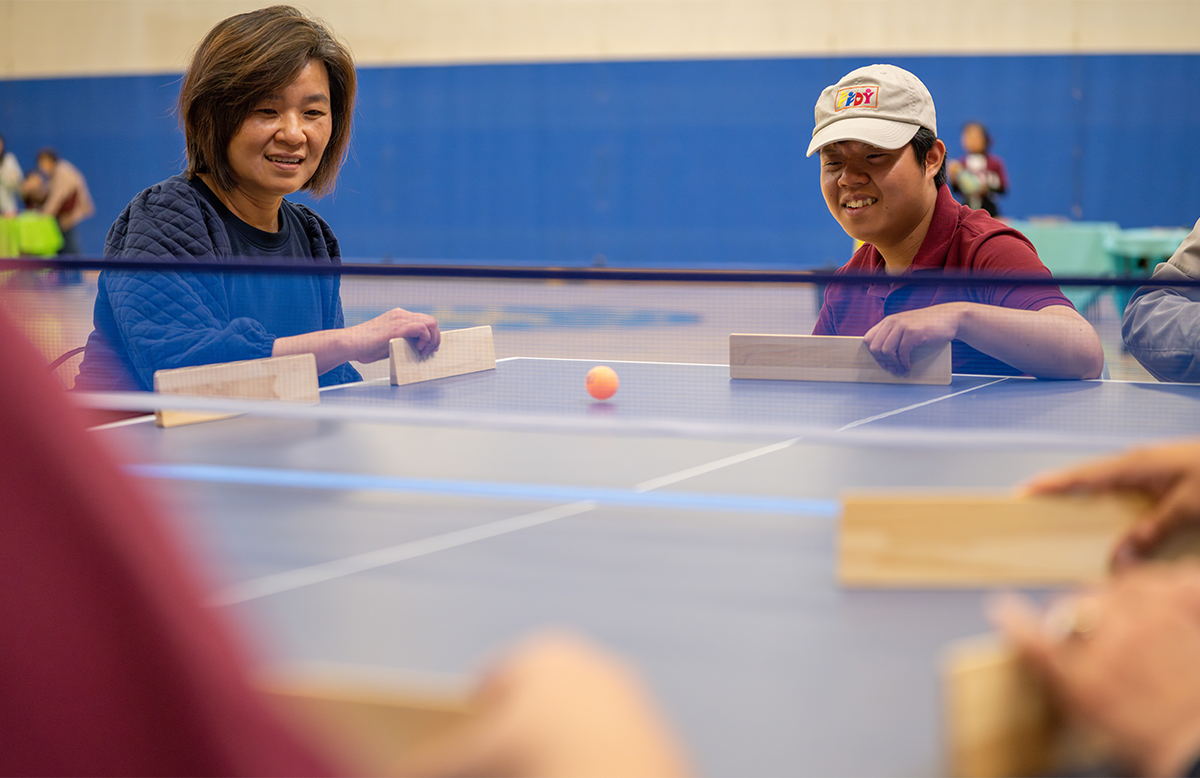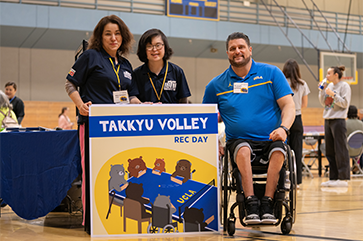UCLA’s Sports and Society Lab
Creating — and celebrating — access and inclusion

David Esquivel / UCLA
UCLA adaptive and instructional programs coordinator Michael Garafola, right, at the Takkyu Volley Rec Day on April 27, 2024
By Jacqueline Jacobo | October 21, 2024
Last spring, UCLA’s John Wooden Center became the host of a unique connection between Japan and the U.S. – Takkyu Volley Rec Day. Around 80 people filled the gym, sitting around table tennis tables and volleying a weighted ping-pong ball with long wooden paddles. As competition got fun and fierce, certified referees from Japan helped everyone smoothly learn the rules and history of the sport.
Takkyu Volley is designed to be universally accessible — anyone, regardless of ability or age, can enjoy a game. Through the game’s inclusive nature, Takkyu Volley Rec Day became yet another successful effort birthed out of UCLA’s Sports and Society Lab’s mission to highlight adapted sports as well as their athletes and to educate the wider Los Angeles community about them.
Ariel Hernandez is one of the brains behind it all. He joined UCLA’s Disability Studies program in the midst of the COVID-19 pandemic when he created the disability and gender studies class “Sports, Normativity, and Body” as well as directed an effort to bring Japanese and American Paralympians together for an online panel. In 2022, he became the Sports and Society Lab’s lead scientist.
“Those two things set the stage for the lab,” said Hernandez.
Part of UCLA’s Disability Studies Inclusion Labs effort, the Sports and Society Lab was initially a smaller project created by UCLA’s Disability Studies program to address the intersection of sports and disabilities through an academic lens at the 2015 Special Olympics World Games held in Los Angeles. Today, the lab divides its focus into three key areas in adapted athletics: high performance, recreation and leisure, and youth sports and coaching.
High performance focuses on supporting disabled athletes competing at a global or elite scale, like Paralympians, by highlighting them to the wider UCLA community through their website. These athletes are often the face of adapted sports to the general public, creating a misconception that parasports are only made to be played at the highest level.

David Esquivel / UCLA
“Being able to have a world in which everyone can participate in community, activity and in something larger than themselves is more than important,” said Hernandez.
To change popular convictions about parasports, the recreation and leisure focus area takes a broad scope to “think about the lifespan” and actualize the health and social benefits parasports can have on anybody’s day-to-day life, especially as research has pointed toward a correlation between disability and low levels of physical activity. Given UCLA’s proximity to the beach and mountains, Hernandez hopes that this focus area helps promote accessibility to both indoor and outdoor physical activities for all LA residents.
The youth sports and coaching focus area hopes to introduce parasports to aspiring athletes, whether they choose to pursue it at a competitive or recreational level. Hernandez said that this section focuses on K–12 athletics by asking questions about whether disabled children are integrated with their non-disabled peers during physical education, and what kind of activities are being offered to these students. In 2022, the lab was able to host Atsushi Nakazawa, a professor of sports science at Tokyo’s Waseda University, to talk about the history of extracurricular sports and disability inclusion in Japan.
“There are too many examples of people with disabilities being excluded and missing out on, not only the health benefits, but also just being a part of what we would call everyday life,” said Hernandez.
Other lab initiatives include March Madness wheelchair basketball during UCLA’s First Thursdays and a photography exhibit on adapted skateboarding, bringing together Westwood’s tight-knit community to support parasports. The lab also currently engages in scientific research through the individual projects of their affiliates, like Celina Shirazipour, an assistant professor-in-residence at UCLA’s David Geffen School of Medicine, who has been working with both Invictus Games and e-sport athletes to determine the best practices to promote community participation in quality exercise to people with physical and psychological injuries.
In the future, the lab hopes to broaden its bibliography, which compiles research, literature and film at the intersection of disabilities and sports. By pulling from sources found through UCLA Library, Hernandez hopes that students and faculty alike will be able to use and learn from their resources. The lab is also currently in the process of obtaining funding for research projects, which both undergraduate and graduate students will be able to participate in this upcoming fall. Hernandez also said that the lab plans to grow its influence before the L.A.-hosted 2028 Summer Olympics and Paralympics by bringing more international parasports, like Takkyu Volley, to campus.
Hernandez hopes that people can not only support adapted athletes, but that the public can recognize that their challenges and capabilities are not monolithic. He noted that geography can shape one’s adapted sports experience — an athlete in South Los Angeles might face different barriers than an athlete in Aspen, Colorado, due to factors such as topography, weather, economic status, and transportation. He hopes that through the Sports and Society Lab, he can begin to see similar impacts mirrored onto communities beyond Westwood.
“Being able to have a world in which everyone can participate in community, activity and in something larger than themselves is more than important,” said Hernandez.
If you are a student interested in participating in the Sports and Society Lab’s research, contact dslabs@ucla.edu.



